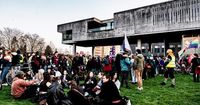On March 27, 2025, the city of Ghent found itself at the center of a heated political clash as two opposing demonstrations unfolded simultaneously, reflecting deep societal divisions. The far-right student organization NSV! organized a rally advocating for 'remigration,' which incited significant outrage among various community groups and political leaders.
Mayor Mathias De Clercq, representing the Open Vld party, took a stand against the NSV!'s controversial pamphlet calling for the demonstration. He filed a complaint about its inflammatory content, although he was unable to ban the event outright. In response to the NSV! rally, a coalition of around twenty organizations came together to organize a solidarity march, emphasizing that 'hate' has no place in Ghent.
The police were on high alert, preparing for potential clashes as both groups planned separate routes and departure times for their demonstrations. Authorities estimated that approximately 1,000 people participated in the solidarity march, showcasing a significant turnout against the far-right rhetoric.
Among the notable figures present at the solidarity event was musician Frederik Sioen, who expressed his disapproval of the NSV!'s message. "Gent is a solidaire stad, and die haatspraak van NSV! kunnen wij niet accepteren. Ik vind het jammer dat mensen perse moeten discrimineren. Met woorden kan je ook veel schade aanrichten," Sioen remarked, emphasizing the potential harm of hateful speech.
Estée De Vries from Jongsocialisten Gent also spoke at the solidarity march, clarifying that their event was not intended as a counter-protest but rather a celebration of solidarity. "Dit is geen tegenbetoging, dit is een parade van solidariteit, en straks bouwen we een feestje onder de Stadshal," she stated, highlighting the positive intentions behind their gathering.
Meanwhile, the NSV! demonstration commenced at the Zuid area, with approximately 400 participants. Tom Claeys, the president of the NSV!, articulated the group's objective, stating, "We willen remigratie in het maatschappelijk debat brengen. We willen dat het besproken wordt, dat mensen leren dat remigratie betekent dat er illegalen worden teruggestuurd." He pointed to recent crimes as justification for their stance, arguing that many perpetrators were individuals who should not have been in the country in the first place.
The NSV! rally also saw the presence of prominent politicians from the Vlaams Belang party, including Tom Van Grieken, Filip Brusselmans, Chris Janssens, and Dries Van Langenhove, who lent their support to the cause.
As tensions escalated, the police took precautionary measures to maintain order. They deployed a water cannon during the events to manage the crowd and prevent any potential violence. Reports indicated that seven individuals wearing balaclavas were arrested during the demonstrations, underscoring the charged atmosphere in Ghent that evening.
The dual demonstrations highlighted the stark political divide in Belgium, with the NSV! rally advocating for policies that many view as exclusionary, while the solidarity march sought to promote inclusivity and reject hate speech. The contrasting messages from both groups reflect broader societal debates surrounding immigration, nationalism, and community values.
While the police succeeded in keeping the two groups separated, the underlying tensions remain a point of concern for local leaders and community members alike. The events of March 27 serve as a reminder of the ongoing struggles within Belgian society regarding issues of identity, belonging, and the impact of political rhetoric.
As Ghent continues to grapple with these challenges, the community's response to such demonstrations will likely shape the discourse around immigration and social cohesion in the years to come.

